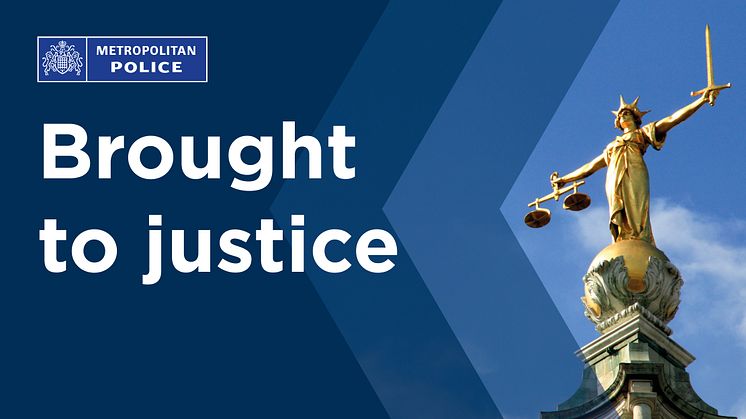
News -
Man who funded terrorist fighter in Syria sentenced following a Met counter terrorism investigation
A man who sent money to his nephew in Syria knowing it was to fund his terrorist activity has been sentenced for terrorism offences following an investigation by specialist officers from the Met’s Counter Terrorism Command.
Through their investigation, detectives found that 46-year-old Farhad Mohammad arranged for $350.00 over two payments to be sent to his nephew, Idris Usman. However, the investigation uncovered that Usman was fighting in Syria at the time for the terrorist group Hay’at Tahrir al-Sham, which is a proscribed organisation in the UK.
On 26 April, Mohammad was found guilty of two terrorism funding offences following a ten-day trial at the Old Bailey. He was sentenced on 23 October to a three year community order, 250 hours unpaid work, three month curfew between 9pm and 8am and a 30 day Rehabilitation Supervision Order.
During the trial, counter terrorism investigators presented evidence showing Mohammad made two payments to his nephew in the space of three months between November 2017 and January 2018 with the knowledge that his nephew was fighting for an Islamist terrorist group in Syria at the time.
One of the messages found by officers on Mohammad’s phone from his nephew in May 2017 read: “Uncle forgive me, God willing I am going to participate in a fighting, either I will stay alive or I become a martyr, it is up to God.”
After initial enquiries were carried out by officers from the Eastern Region Special Operations Unit (ERSOU), the investigation was taken on by specialist investigators within the National Terrorist Financial Investigation Unit, which is based within the Met’s Counter Terrorism Command. Detectives identified that the money, which was sent between November 2017 and January 2018, was transferred via a third-party to Usman.
As a result of meticulous investigative work, Counter Terrorism officers were able to prove that Mohammad was fully aware that the money he was sending was supporting his nephew’s terrorist activities.
Another example of a message found by officers from Usman to Mohammad in June 2017, indicating he was aware of his terrorist activities read: “Uncle for the sake of God send me six and a half waraqa ($650), to buy a weapon, it is the one, which I like it, and may God reward you with good.” Also among the messages sent from Usman to his Uncle was an image sent in August 2017 showing Usman sat on a motorbike with a gun over his shoulder.
Commander Dominic Murphy, who leads the Met’s Counter Terrorism Command, said: “Terrorist groups rely on financial support and funding to be able to operate. While Mohammad’s contributions may not have been vast sums, he was well aware his nephew wanted the money to purchase a firearm and to help fund his fighting in Syria.
“Groups like Hay’at Tahrir al-Sham cause huge misery, terror and devastation. If you knowingly fund someone - family member or not - who is part of a group like that, then it is helping a terrorist organisation and it is something we take extremely seriously.”
On 27 February 2018, Mohammad planned to travel to Turkey from London Stansted airport. However, before he boarded the flight, he was stopped by officers using powers under Schedule 7 of the Terrorism Act, 2000.
Officers found he had over £4,000 of cash, and three mobile phones - all of which were seized and the contents downloaded by officers, with Mohammad subsequently arrested.
Detectives recovered messaging app conversations and voice notes, which, after careful piecing together, officers were able to use to produce a timeline of detailing his conversations and fund transfers.
Commander Murphy added: “The use of counter terrorism powers by officers at the airport was crucial in discovering how Mohammad was knowingly funding his nephew’s terrorist activities in Syria. And it was the specialist skills of officers within our National Terrorist Financial Investigation Unit which helped pinpoint the transactions that led to this prosecution.
“Anyone who might be considering providing financial support to terrorists or terrorist organisations should think twice, as it is a serious offence and, as we’ve shown here, we will investigate those who are involved in this kind of activity.”
Farhad Mohammad, 46, (21.10.1978) of Colchester, Essex was charged on 10 July 2023.
He was found guilty on Friday 26 April 2024 of two counts of terrorist fundraising (contrary to section 17 of the Terrorism Act 2000), after a trial at the Old Bailey and was sentenced at the same court on 23 October. Mohammad was found not guilty on two other counts of terrorist fundraising – linked to alleged payments made in May and August 2017. The jury was unable to reach a verdict in respect of a fifth count of terrorist fundraising, relating to an alleged payment made in October 2017. This count will lie on file.
The National Terrorist Financial Investigation Unit (NTFIU) is based within the Met’s Counter Terrorism Command and is comprised of specialist investigators, analysts and researchers who investigate suspicious financial activity where they believe it may have links to terrorism.
Communities defeat terrorism, and information from the public is vital to counter terrorism investigations. If you see or hear something unusual or suspicious and think someone may be engaging in terrorist activity, trust your instincts and act by reporting it in confidence at www.gov.uk/ACT or call the anti-terrorist hotline on 0800 789 321.
In an emergency, always dial 999.

